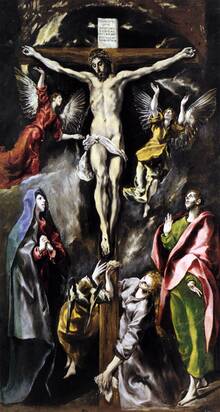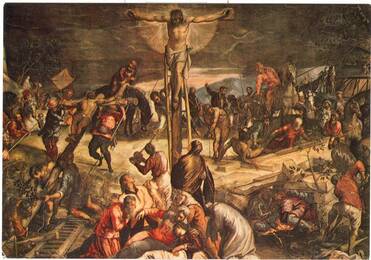The Exaltation of the Cross
Feast day - 14th September
This feast day is particularly celebrated in Medjugorje.
Blessed John Paul II celebrated this feast in Siena in 1980, in Canada in 1984, in Albano in 1985, in Aprilia in 1986, in the USA in 1987, in Lesotho in 1988 & in Slovakia in 2003.
Papa Benedict XVI celebrated this feast day in Lourdes in 2008 (for the 150th anniversary of Mary's apparitions to Bernadette) and in Lebanon in 2012 (his last apostolic pilgrimage abroad).
3 2us by Monsignor Leo Maasburg ![]()
"Jesus redeemed us because he accepted all that suffering without hating us. Because the normal human reaction if we are hurt, if we're offended, if we suffer, is at least resentment, if not hatred. And Christ did not hate us for a single second (had he hated us for a single second we would not be here). So in that moment on the Cross, instead of reacting humanly, he reacted divinely. He said 'Father, forgive them, they do not know what they are doing.' And maybe the young people of our day have understood that there is suffering in the world - there is no life without suffering, we cannot avoid, we cannot flee suffering; so suffering is part of our human condition. But the answer, our reaction to suffering, is a revelation either of our human state or of our divine state. And I believe that this celebration of the Exultation of the Cross is for us a question mark: where are you standing? How are you reacting to suffering? Are you so close to Christ that you say "His example, his suffering on the Cross will give me the strength to at least attempt not to hit back, not to hate, not to have resentments, but to say 'Father help me to the will of forgiveness and please forgive.'"
3 2us by Father Peter Pitre CSJ ![]()
"If we let ourselves be drawn to Jesus, His Cross even now is lifted up within us."
Feast of the Exaltation of the Cross 2013
In his homily, Pope Francis said that it is in the mystery of the Cross that we find the story of mankind and the story of God, synthesised by the Fathers of the Church in the comparison between the tree of the knowledge of good and evil in Paradise, and the tree of the Cross:
“The one tree has wrought so much evil, the other tree has brought us to salvation, to health. This is the course of the humanity’s story: a journey to find Jesus Christ the Redeemer, who gives His life for love. God, in fact, has not sent the Son into the world to condemn the world, but that the world might be saved through Him. This tree of the Cross saves us, all of us, from the consequences of that other tree, where self-sufficiency, arrogance, the pride of us wanting to know all things according to our own mentality, according to our own criteria, and also according to that presumption of being and becoming the only judges of the world. This is the story of mankind: from one tree to the other.”
In the Cross there is the “story of God”, the Pope continued, "because we can say that God has a story.” In fact “He has chosen to take up our story and to journey with us”, becoming man, assuming the condition of a slave and making Himself obedient even to death on a Cross:
“God takes this course for love! There’s no other explanation: love alone does this. Today we look upon the Cross, the story of mankind and the story of God. We look upon this Cross, where you can try that honey of aloe, that bitter honey, that bitter sweetness of the sacrifice of Jesus. But this mystery is so great, and we cannot by ourselves look well upon this mystery, not so much to understand – yes, to understand – but to feel deeply the salvation of this mystery. First of all the mystery of the Cross. It can only be understood, a little bit, by kneeling, in prayer, but also through tears: they are the tears that bring us close to this mystery.”
“Without weeping, heartfelt weeping”, Pope Francis emphasized, we can never understand this mystery. It is “the cry of the penitent, the cry of the brother and the sister who are looking upon so much human misery” and looking on Jesus, but “kneeling and weeping” and “never alone, never alone!”
“In order to enter into this mystery, which is not a labyrinth but slightly resembles one, we need the Mother, the mother’s hand. That she, Mary, will make us understand how great and humble this mystery is; how sweet as honey and how bitter as aloe. That she will be the one who accompanies us on this journey, which no one can take if not ourselves. Each one of us must take it! With the mother, weeping and on our knees.”
(from News.VA)
Homily of St Andrew of Crete
(Or 10)
We are celebrating the feast of the cross, whereby darkness was dispelled and the light restored. We are celebrating the feast of the cross, and with the crucified one we are raised up, leaving behind us the earth and sin so that we may possess what is above. How great the cross! What blessings it holds! He who possesses it possesses a treasure. More noble, more precious than anything on earth, in fact and in name, it is indeed a treasure, for in it and through it and for it all the riches of our salvation were stored away and restored to us.
If there had been no cross, Christ would not have been crucified. If there had been no cross, Life would not have been nailed to the tree. If he had not been nailed, the streams of everlasting life would not have welled from his side, blood and water, the cleansing of the world; the record of our sins would not have been cancelled, we would not have gained freedom, we would not have enjoyed the tree of life, paradise would not have been opened. If there had been no cross, death would not have been trodden under foot, the underworld would not have yielded up its spoils.
How great the cross, through which we have received a multitude of blessings, because, against all reckoning, the miracles and sufferings of Christ have been victorious@ How precious, the means of God's suffering, and his trophy of victory. On it of his own will he suffered unto death. On it he won his victory, wounding the devil, and conquering death, and shattering the bars of the underworld. The cross has become the common salvation of the whole world.
The cross is called the glory of Christ, and his exaltation; it is the chalice for which he longed, the consummation of his sufferings on our behalf. It is the glory of Christ - listen to his words: 'Now is the Son of man glorified, and God is glorified in him, and God will glorify him at once.' And again: 'Glorify me, Father, with the glory which I had with you before the world was made.' And again: 'Father, glorify your name. So there came a voice from the heavens: I have glorified it, and I will glorify it again.' By this he means the glory which Christ received on the cross.
The cross is also Christ's exaltation - listen again to his own words: 'When I am lifted up, I will draw all men to myself.' You see then that the cross is the glory and the exaltation of Christ.


